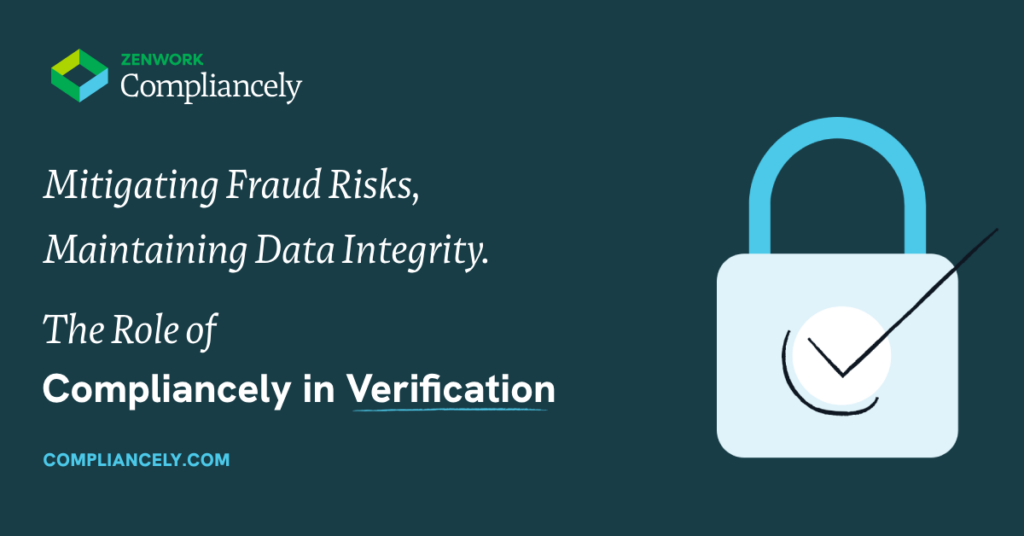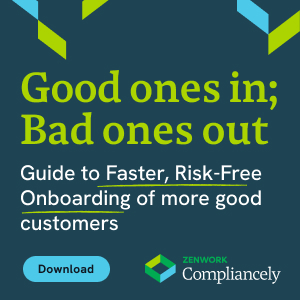Mitigating Fraud Risks, Maintaining Data Integrity, and the Role of Compliancely in Verification

In today’s digital landscape, fraud risks and compromised data integrity pose significant challenges for individuals and organizations. Accurate verification is crucial in mitigating these risks, ensuring reliable transactions, and safeguarding sensitive information. This blog explores the importance of accurate verification, its impact on fraud prevention and data integrity, and highlights the role of Compliancely – a comprehensive verification solution in enhancing accuracy and compliance.
In an increasingly interconnected world, the rise of fraud and compromised data integrity has become a pressing concern. From identity theft to financial scams, the consequences of fraudulent activities can devastate individuals and organizations.
The key to combating these risks lies in accurate verification – a critical process that ensures the legitimacy of identities, transactions, and information. This blog delves into the importance of accurate verification in mitigating fraud risks and maintaining data integrity.
Furthermore, we will explore the role of Compliancely, a comprehensive verification solution that streamlines and enhances the verification process while ensuring compliance with legal and regulatory requirements.
So, fasten your seatbelts as we embark on a journey to understand the crucial role of accurate verification and discover how Compliancely empowers organizations in the fight against fraud and data compromise.
Understanding Fraud Risks
In a world where deception thrives, fraud is a master of disguise. It encompasses a web of intentional deception and manipulation with the sole purpose of personal gain. From identity theft to financial scams, fraud poses a grave threat to individuals and organizations.
For individuals, the consequences of falling victim to fraud can be devastating. It shatters financial security, tarnishes credit scores, and leaves them grappling with the aftermath of stolen identities. The emotional toll and the painstaking process of reclaiming their lives can be overwhelming.
Organizations, too, face a relentless battle against fraud. It siphons off financial resources, stains reputations, and plunges them into legal tangles. The fallout of data breaches resulting from fraudulent activities can lead to regulatory fines, lawsuits, and irreparable damage to trust and credibility.
Various types of fraud prevalent in today’s digital landscape
- Phishing Scams: Phishing involves using deceptive emails, text messages, or websites that mimic legitimate entities to trick individuals into revealing sensitive information like passwords, credit card details, or social security numbers. These scams often employ social engineering techniques to manipulate victims into taking actions that benefit the fraudsters.
- Identity Theft: Identity theft occurs when someone illegally acquires and uses another person’s personal information, such as their name, social security number, or financial details, without their consent. This stolen information is then exploited for financial gain, leading to fraudulent transactions, unauthorized access to accounts, and potential damage to the victim’s credit history.
- Online Payment Fraud: With the rise of e-commerce and digital payment systems, online payment fraud has become a significant concern. Fraudsters employ various tactics, such as stolen credit card details, account takeover, or fake online stores, to deceive unsuspecting consumers, make unauthorized purchases, or drain funds from their accounts.
- Investment and Financial Fraud: Investment scams lure individuals with promises of high returns or exclusive opportunities, only to swindle their money. Ponzi schemes, pyramid schemes, and fraudulent investment advisors are examples of financial fraud that prey on people’s desire for financial growth.
- Malware and Ransomware Attacks: Malware refers to malicious software designed to infiltrate computer systems, steal sensitive information, or gain unauthorized access. Ransomware, a type of malware, encrypts victims’ data and demands a ransom for its release. These attacks can disrupt operations, compromise data integrity, and inflict financial harm.
These are just a few examples of fraud prevalent in the digital landscape. As technology advances, fraudsters continue to adapt their methods, making it crucial for individuals and organizations to stay vigilant, implement robust security measures, and leverage accurate verification processes to mitigate the risks associated with these fraudulent activities.
The Role of Verification in Fraud Prevention
Verifying identities, transactions, and information is crucial in the fight against fraud. It acts as a fundamental safeguard, enabling individuals and organizations to establish the true identity of individuals, validate the legitimacy of transactions, and ensure the accuracy of information. Without proper verification, the door remains open for fraudsters to exploit vulnerabilities, compromise data integrity, and perpetrate fraudulent activities undetected.
Benefits of Accurate Verification in Mitigating Fraud Risks
- Reducing Financial Losses: Accurate verification processes help minimize financial losses by detecting and preventing fraudulent transactions. By confirming the legitimacy of identities and transactions, organizations can identify and halt unauthorized activities, saving themselves and their customers from significant monetary damage.
- Protecting Customer Trust and Reputation: Verifying identities and information fosters trust between organizations and customers. By implementing robust verification measures, organizations demonstrate their commitment to protecting their customers’ interests, instilling confidence in their services, and safeguarding their reputation.
- Compliance with Legal and Regulatory Requirements: Accurate verification is crucial for organizations to comply with legal and regulatory frameworks. Many industries, such as banking, healthcare, and fintech, have specific requirements for identity verification and fraud prevention. Adhering to these requirements ensures that organizations maintain compliance, avoid penalties, and operate within the bounds of the law.
Maintaining Data Integrity through Verification
Data integrity refers to data’s accuracy, consistency, and reliability throughout its lifecycle. It ensures that data remains unaltered, complete, and trustworthy, free from errors, corruption, or unauthorized modifications.
Inaccurate or compromised data poses significant risks to individuals and organizations. It can lead to erroneous insights, flawed decision-making, financial losses, and reputational damage. Inaccurate data can also have severe consequences in sensitive domains like healthcare, where incorrect medical records or treatments can jeopardize patient well-being and safety. Additionally, compromised data can fuel identity theft, fraud, and other malicious activities, further exacerbating risks.
How Accurate Verification Helps in Maintaining Data Integrity
- Identifying and Preventing Data Breaches: Accurate verification processes help detect and prevent data breaches by verifying the authenticity of access attempts and ensuring that only authorized individuals or entities can access sensitive information. Organizations can minimize the risk of unauthorized data access and potential breaches by implementing stringent identity verification measures.
- Ensuring the Accuracy and Reliability of Information: Verification plays a crucial role in maintaining the accuracy and reliability of data. By verifying the sources, authenticity, and integrity of data, organizations can be confident in the quality of their information. Accurate verification ensures that data is collected from reliable sources and undergoes validation checks, reducing the chances of errors, false information, or data manipulation.
- Safeguarding Sensitive Data and Personal Information: Accurate verification helps protect sensitive data and personal information from unauthorized access or misuse. By verifying the identities of individuals with access to such data, organizations can implement robust security measures and limit the exposure of sensitive information to potential threats. This safeguards individuals’ privacy, prevents data leaks, and reduces the risk of identity theft or fraud.
Introducing Compliancely and Its Comprehensive Verification Solution
In the realm of accurate verification and fraud prevention, Compliancely emerges as a powerful ally. Compliancely is a comprehensive verification solution designed to streamline and enhance the verification process while ensuring compliance with legal and regulatory requirements. With its advanced capabilities, Compliancely aims to empower organizations to combat fraud risks, maintain data integrity, and establish a secure environment for their customers and stakeholders.
Let’s explore some of the key verification checks provided by Compliancely:
TIN Match: Compliancely enables organizations to verify the accuracy of Tax Identification Numbers (TINs) by cross-referencing them with official records. This helps prevent identity fraud and ensures compliance with tax regulations.
OFAC Watchlist: Compliancely screens business entities against the Office of Foreign Assets Control (OFAC) watchlist. This critical check helps identify and prevent potential business dealings with individuals or entities associated with money laundering, terrorism, or other illegal activities.
SOS (Secretary of State) Verification: Compliancely validates business entities by verifying their registration and standing with the Secretary of State or equivalent government agencies. This check ensures that organizations are dealing with legally registered and legitimate entities.
FATCA List: Compliancely assists organizations in complying with the Foreign Account Tax Compliance Act (FATCA) by verifying if a business entity appears on the FATCA list. This verification helps ensure adherence to international tax reporting requirements.
Excluded Individuals and Entities: Compliancely performs checks against lists of excluded individuals and entities, such as the List of Excluded Individuals/Entities (LEIE). This verification helps organizations avoid engaging in business with prohibited individuals or entities, safeguarding against potential legal and reputational risks.
By incorporating these and more verification checks, Compliancely empowers organizations to maintain compliance, mitigate fraud risks, and preserve the integrity of business transactions and relationships. The real-time nature of these checks allows for the timely identification of potential red flags, enabling organizations to take proactive measures and ensure the authenticity and legitimacy of their business dealings.
